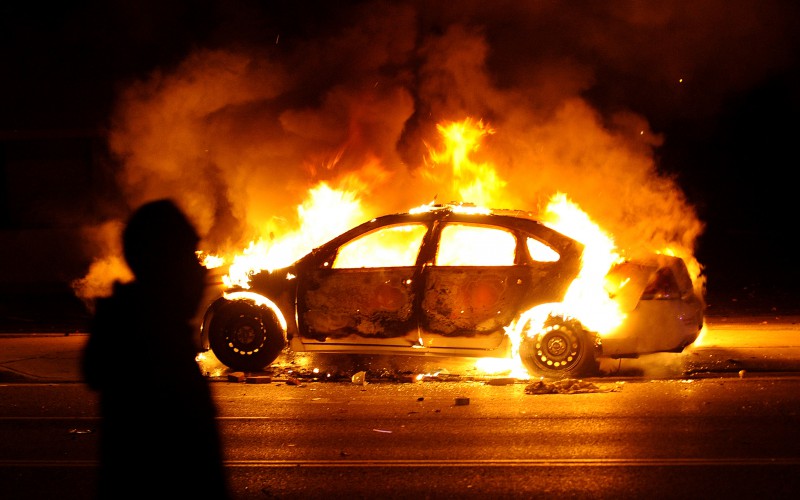Activist warns: Return of warm weather to St. Louis could mean violence
TNS/A St. Louis County police car was set on fire along South Florissant Road in Ferguson following the announcement of the grand jury decision on Nov. 24, 2014.
ST. LOUIS COUNTY, Mo. (TNS) — A leader of a community outreach group warned fact-finders for a federal civil rights agency Monday that warm weather could spark more street violence in lingering resentment of police shootings.
“As St. Louis walks into this next warm season, and it’s right around the corner, we’re not ready for what’s going to come out of our neighborhoods,” said James Clark, vice president of the nonprofit organization Better Family Life.
“This is going to be a very, very challenging time in our community as it relates to crime and violence. Once this weather breaks there are going to be challenges for the police officers,” Clark said. “How the police are going to manage it — my prayers are with them.”
Clark participated in one of several panels addressing the Missouri Advisory Committee to the U.S. Commission on Civil Rights. It is examining police use of force relating to race or color.
The commission is an independent, bipartisan agency that advises the president and Congress on civil rights matters. It took an active interest here after the shooting of a black 18-year-old, Michael Brown, by a Ferguson police officer Aug. 9.
Panels of academics, activists, police and government officials met through the day at the University of Missouri-St. Louis. Public attendance appeared light, about two dozen as Clark spoke.
St. Louis Police Chief Sam Dotson said he is being as transparent as possible about shootings by officers, and touted creation of a unit dedicated to investigate them.
Capt. Mary Edwards-Fears said the department provided a rapid and detailed account when two St. Louis officers fatally shot Kajieme Powell about a week after Brown died. Officials said Powell came at the officers with a knife.
“People will not tolerate being kept out of the information loop, especially when it comes to policing and public safety,” Edwards-Fears said. “When it comes to critical incidents, we must explain ourselves fully and quickly.”
Dotson has admitted that in a rush to provide information that day, he passed along an observation of a witness that turned out to be contradicted by a bystander’s video of the killing. The police have not released the officers’ names, something Dotson said he will do once Circuit Attorney Jennifer Joyce has completed her review of the case.
Edwards-Fears said the “truly tragic” killing of Powell “presented us a huge opportunity to educate the public, especially on our use-of-force policy and why we do things the way we do them.”
Joining Clark on a panel of activists earlier in the day were Charli Cooksey with the Young Citizen’s Council of St. Louis, J. Alfredo Chavez with Latinos en Axon St. Louis, David Nehrt-Flores with Missouri Immigrant and Refugee Advocates, and the Rev. Traci Blackmon with Christ the King Church in Florissant.
Chavez said that Latinos are the victims of racial profiling more often than statistics indicate, because of the way police tally stops.
“When they stop you, they don’t put you as Latino or Hispanics. They put you as a white,” he asserted.
He also alleged that officials are quick to deport Latinos after minor traffic stops. “They don’t take us to jail. They deport us. They take us out of here. They don’t care about the separation of families,” Chavez complained.
Blackmon said police cannot gain public trust unless they hold officers accountable for their own illegal or unethical behavior.
“When somebody gets hurt or there’s a robbery, (police) will come on and say, ‘We know somebody saw it. But no witnesses will come forward.’
“I feel the same thing, the same way about when an officer who has taken an oath to serve and protect violates that oath and other officers are present and nobody speaks up,” she said.
St. Louis County Police Chief Jon Belmar and Dotson responded with statistics from internal affairs investigations.
Dotson said St. Louis police logged 200 internal affairs complaints from other officers in 2014 and 57 from the public. Belmar said his department had 138 from officers and 69 from the public.
“We do a better job of making allegations against officers than the public does,” Belmar noted.
It will be tough to regain public with the fragmentation in St. Louis County, Belmar said. He noted there are 63 separate police departments, some he said operating solely to “tax the driving public.”
“The parts do not equal the sum,” Belmar said. “People don’t know the difference between us, we’re just the police and we get lumped together.”
A commission member asked Belmar what can be done about rogue departments. The chief suggested that the state, which sets standards for individual officers, also impose standards on police departments.
“I’ve had a front row seat to all of this for 29 years, and the political will to discuss these issues wasn’t there until Michael Brown’s death,” Belmar said.
The committee plans a follow up meeting in Kansas City later this year, after which it will issue findings and recommendations.
–Paul Hampel
St. Louis Post-Dispatch
St. Louis Post-Dispatch

No comments:
Post a Comment
Thanks for commenting. Your comments are needed for helping to improve the discussion.